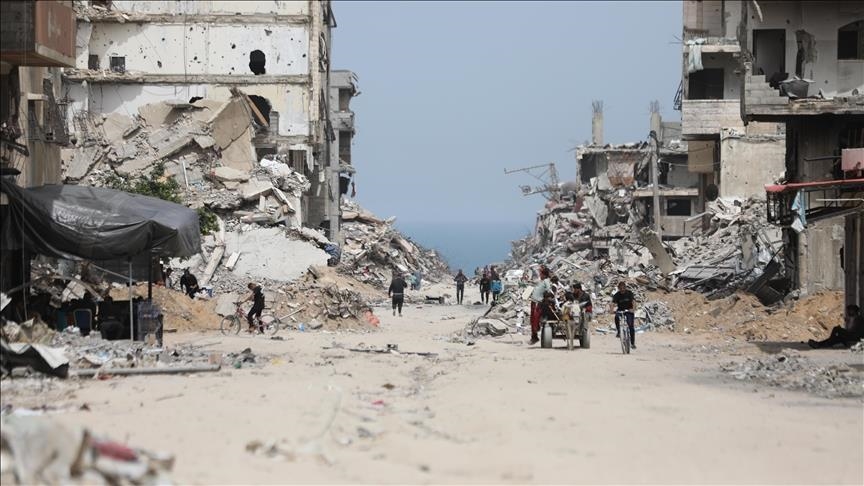GENEVA
The economy in the Gaza Strip had shrunk to less than one-sixth of pre-war levels by the middle of 2024, the UN Conference on Trade and Development (UNCTAD) said Thursday in its latest report.
The report underlined the “staggering scale of economic devastation and unprecedented decline in economic activity, far surpassing the impact of all previous military confrontations in 2008, 2012, 2014 and 2021.”
By early 2024, between 80%-96% of Gaza’s agricultural assets had been decimated, it said, resulting in a significant decline in food production capacity and an exacerbation of the already high levels of food insecurity.
The destruction also significantly affected the private sector, according to the report, with 82% of businesses, a crucial driver of Gaza’s economy, damaged or destroyed. It stressed that damage to the productive base is expected to worsen as the military operation continues.
Regarding Gaza’s Gross Domestic Product (GDP), the report found it plummeted 81% in the last quarter of 2023, leading to a 22% contraction for the entire year.
“By mid-2024 Gaza’s economy had shrunk to less than one-sixth of its 2022 level,” it said, adding that two-thirds of pre-war jobs, about 201,000 positions, were lost by January 2024, worsening the “already critical” economic and humanitarian crisis in the enclave.
West Bank undergoing ‘rapid, alarming’ economic decline
The report said the West Bank has been undergoing a “rapid and alarming” economic decline due to factors such as settlement expansion, land confiscations, demolition of Palestinian structures and increased settler violence throughout 2023-2024, which has displaced communities and severely affected economic activities.
“These disruptions have affected various sectors across the West Bank, including East Jerusalem, where commerce, tourism and transportation have suffered a considerable downturn,” it said. “As a result, 80% of businesses in the East Jerusalem Old City have either partially or completely ceased operations.”
It noted the initial optimism of a 4% GDP growth in the West Bank during the first three quarters of 2023 was abruptly reversed by an unprecedented 19% contraction in the fourth quarter, resulting in an overall annual GDP decline of 1.9%.
UNCTAD said per capita GDP decreased 4.5%, indicating a substantial drop in living standards and household incomes.
Labor market conditions in the West Bank, meanwhile, have significantly deteriorated, with 96% of businesses reporting decreased activity and 42.1% reducing their workforce.
It said 306,000 jobs have been lost, pushing the West Bank’s unemployment rate from 12.9% before the conflict to 32%.
Trade activities have also been “severely disrupted” due to increased restrictions on the movement of people and goods, as the number of checkpoints across the occupied West Bank rose from 567 in early October 2023 to 700 by February.
Regarding poverty, the report said it has been “widespread and growing” in recent years.
“By 2022, one-third of the Palestinian population (1.84 million people) was food insecure, or severely food insecure, and 31.1% lived in poverty,” it said. “Before October 2023, 80% of Gaza’s population depended on international assistance. Currently, poverty affects nearly the entire population of Gaza and is rising rapidly in the West Bank.”
It added that revenue cuts and reduced aid are crippling the Palestinian government’s ability to function.
The report echoed UN Secretary-General Antonio Guterres’ demand for urgent measures to support and strengthen Palestinian institutions, highlighting the need to enhance peace-building efforts.
“Prolonged occupation is a primary economic obstacle to sustainable development due to ongoing restrictions on investment, labor mobility, and trade,” said the report.

